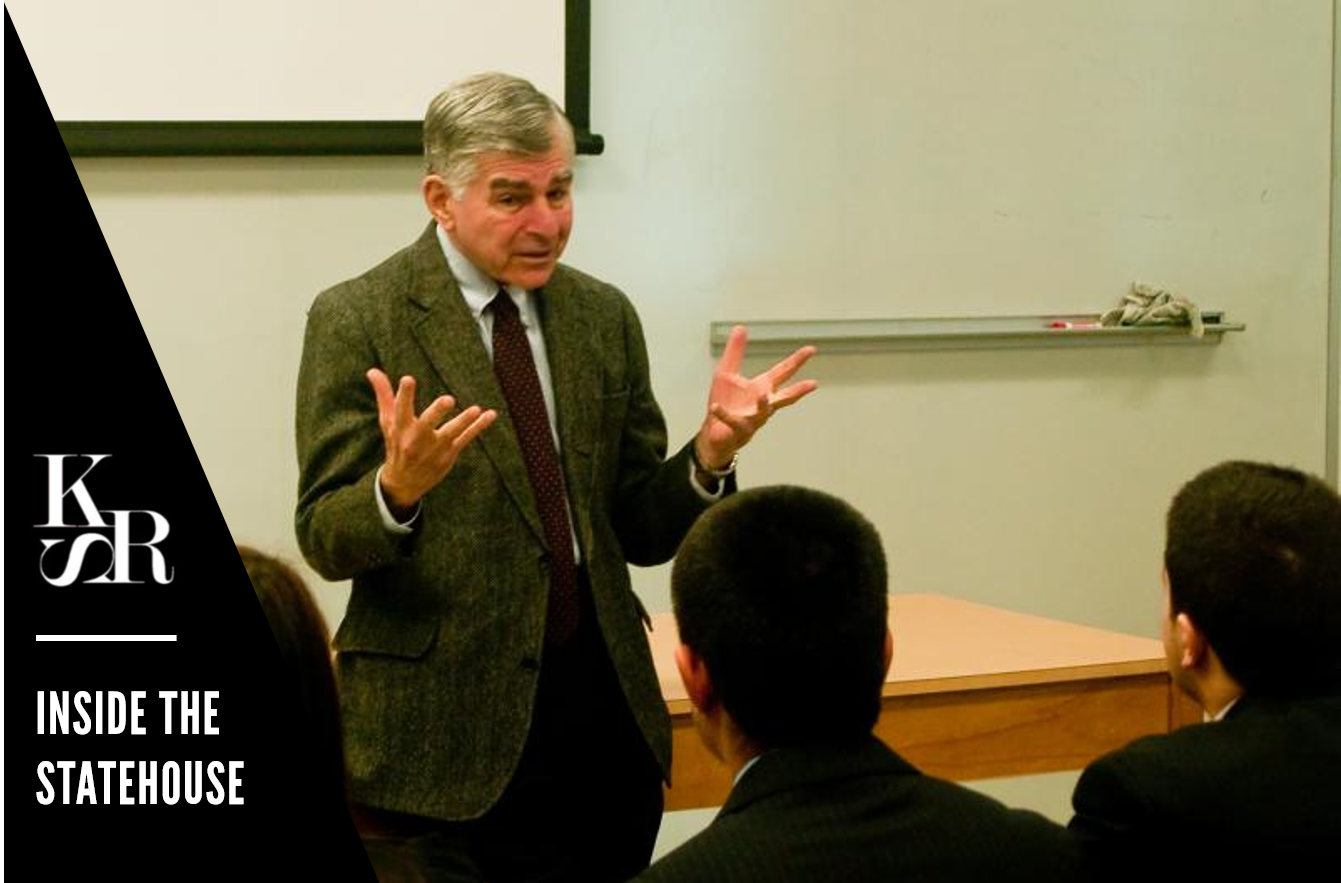BY JAMES PAGANO
To kick off the Kennedy School Review’s special series In the Statehouse, Governor Dukakis spoke with me about what drew him to politics, how racial attitudes in Massachusetts have changed over time, his own advice for policy students interested in state government, and his aspirations for a more united Democratic Party. Michael Dukakis served three terms as Governor of Massachusetts and was the 1988 Democratic nominee for President.
This interview was recorded on August 16th, 2017.
ON SEEKING PUBLIC OFFICE
You began your political career as an Elected Town Meeting Member. How and why did you decide to pursue that office?
People of color couldn’t live in the town of Brookline. In point of fact, people of color couldn’t live on this side of the railroad tracks in Boston.
Anti-Semitism was rife. We have a grandson who is going to be coming to Tufts in a few weeks. His grandmother, Kitty, was explaining to him when she was his age she couldn’t step foot in the Longwood Cricket Club because she was Jewish! That was the world we grew up in. I was bothered by this.
So, I got involved and interested, went to Swarthmore, got quite active politically down there. I was drafted right out of Swarthmore. Then I came back from the military, went to Harvard Law School, and began getting active politically in the town. One of the easiest ways to do it was to run for Town Meeting. You run from a precinct, approximately 3,000 voters, or 1,500 households. So I printed up a few cards and I went out, rang every doorbell in the precinct, stood in front of the polling place for 13 hours, and got elected.
I know you’ve also had a couple setbacks in your career. For example, you lost the primary after your first term as Governor. How do you collect yourself and decide what’s next?
[Laughing] It’s not fun.
I thought at that point my political career was over. Fortunately, I had the opportunity to go over to the Kennedy School and start teaching, and it was one of the best things that ever happened to me.
Really, [I] had no intention of running again except that [the new Governor] King ran a pretty sleazy administration and there were corruption problems. It was only as a result of that, that I decided I’d run against him a second time.
This time, this was one of the most intensive contests we ever had in this state. I think 300,000 more Democrats voted then had ever voted in a primary. This time, we were out there, and I beat him. I got the Governorship back and was able to serve two terms after that.
ON THE VALUE OF STATE AND LOCAL GOVERNMENT
So much of your career has been focused on the state and local levels. Why do you think…
Why state and local? Well, if you really want to have an impact in a pretty direct way on people’s lives and communities, you’ll have a lot more at the state and local level than you will nationally.
[Take] this whole business of welfare to work. The prevailing view at the time among too many people, including academics, was that you couldn’t do anything, that there are just folks who will be in the dull their whole lives. It’s just a lot of nonsense. We were putting 15,000 welfare mothers to work in that state in good jobs, with training. Most of them never saw welfare again.
It was those kinds of experiences: regional economic development; turning the T from a joke into a modern, functioning public transportation system; women on welfare who got training, went to work, and became great success stories…There was a lot of interest in this [welfare-to-work]. They [Congress] never would have been attracted to it had we not had success stories to talk about at the state and local level.
What advice would you give a student who wants to start a career in state government?
I think a lot of it depends on personality and temperament. There are some folks that probably aren’t made for elective office or don’t choose to pursue it but are terrific public servants. I mean, [as Governor] I was looking for talented people all the time and, I think, it’s fair to say we had one of the most talented groups of people working in state government.
One other thing you’ve got to be very concerned with your own personal life. When Kitty and I were first married in 1963, we decided on two really basic rules. One was dinner at home at 6 o’clock at night, no exceptions. The other was no politics on Sunday with three exceptions: St. Patrick’s Day, Greek Independence Day, and combined Jewish Philanthropy Super Sunday, and on those days, I took off Saturday.
ON BOSTON’S CHANGING RACIAL ATTITUDES
You’ve spoken about the racism and anti-Semitism once common in Boston. In light of events in Charlottesville, how have the city of Boston and state of Massachusetts evolved to become a place that is more welcoming and diverse?
Well, we’ve come miles and it’s a wonderful thing to see and to have been a part of. To have the city of Boston today respond as it has with a mayor who is unequivocally committed to important values and says so, is very gratifying.
It’s obviously disappointing to see that we still have folks in the country, in fact we may some in Massachusetts, that have views about people and race and religion that seem to me to be just totally unacceptable. But, it’s a great feeling to be in a state where the vast majority of folks here, both in and out of politics, are just appalled by this kind of stuff and are willing to say so. I hope more will.
What do you think changed in Boston that is still changing in other places?
Well, it took a lot of work and was not uncontroversial. We had a Fair Housing Committee in the Town of Brookline in the 1960s and early 1970s who had to go out and challenge landlords who were clearly not renting to people of color. The state, to its credit, created a state commission against discrimination that had pretty formidable enforcement power, without which we couldn’t have done this.
I think the fact that so many of us come out of the immigrant experience in this state is also very important. There aren’t too many of us who are more than a generation or two away from immigration. The fact that our universities attract highly talented immigrant folks makes a huge difference as well. These days, I don’t think there is anybody in the state who doesn’t appreciate the fact that we’re a product of immigration, we have gained enormously from that, and that continues.
LOOKING FORWARD ON NATIONAL POLITICS
What advice do you have for the Democratic Party going into 2018 and 2020?
Well I’m concerned about it. I’m concerned about it because the last thing in the world we need is a party that’s arguing internally.
I have a lot of respect for Sanders and what he did, but making single-payer healthcare a litmus test for Democratic candidates in my opinion is crazy. What we ought to be expecting our candidates to say is “I am for universal healthcare.” There are lots of ways of getting there.
Income inequality is serious, it’s got to be dealt with, there are ways to do it, but regional economic development is equally important. A much more impressive and extensive job training system is very important. We’ve got 6 million jobs going begging in this country because we haven’t got people with the skills to fill them. These are good jobs at good wages and decent benefits.
As we get ready for 2018 and 2020, the last thing in the world we need is internal battles over whether or not you’re for single-payer, or for multi-payer, or whatever. The important thing is a commitment to making sure that every American has decent, affordable healthcare. That’s the kind of unifying factor.
The other thing is this grassroots stuff. Buying into this red-blue narrative is a terrible mistake. I carried West Virginia by 12-points. When did they become red? Well, they become red if you ignore them. We start [races] by writing off half the country, which is just dumb. This [Democratic Party] has got to be a 50-state party—every single state.
Would you venture to guess who the Democratic Party will nominate in 2020?
No idea. It’s much too early. Believe me, there will be lots of good candidates.
I just hope they understand that if you’re going to win the presidency, you’ve got to appeal to a very broad cross-section of the American people. The last thing in the world we need is eternal battles over who’s the most pure.
We have work to do, and [it’s] better working together and reaching out, reaching out, reaching out. I hope we can do that.
This is the first in the special Inside the Statehouse series, featuring articles by summer 2017 Dukakis Fellows. The Dukakis Fellowship was established by Marilyn and Calvin Gross to honor the career of Governor Michael Dukakis and expose students to leadership roles in state government. The fellows serve in the executive offices of governors across the country working on a variety of policy challenges. For more information, please click here.

Photo Credit: Patrick Giblin via Flickr
